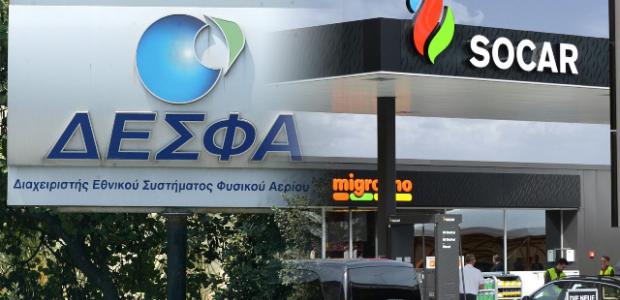It seems that one thing agreed to at a meeting in Athens yesterday between energy minister Panos Skourletis and Anar Mammadov, the managing director of the Azeri energy company Socar’s local subsidiary, is to limit any gas network usage fee increase at DESFA, Greece’s natural gas grid operator, to 30 percent.
Existing DESFA regulations would allow a new owner of the operator to proceed with increases of as much as 65 percent, a prospect which the energy minister wants to avoid at all costs should the long-delayed attempt to sell a 66 percent stake of DESFA be completed and allow its new management to take pricing policy initiatives.
In 2013, Socar had agreed to purchase a 66 percent stake of DESFA after winning an international tender before the European Commission intervened to demand that it surrender 17 percent to a certified European operator.
Socar appears to have accepted the avoidance of such a steep rise in gas network usage fees, which had been agreed to before the Syriza party’s rise to power last year, and factored into the Azeri company’s 400 million-euro offer for a 66 percent of DESFA.
A decision has been reached by local authorities to revise DESFA’s pricing regulations, energypress sources said.
This, of course, will dampen DESFA’s earning potential and, by extension, Socar’s effort to find a buying partner, or partners, for the 17 percent stake the Azeri firm must surrender.
Belgian operator Fluxys and Spain’s Enagas, which had joined forces to consider buying the 17 percent stake together, have withdrawn their interest. Also, recent Azeri reports contending that Dutch firm Gasunie is examining the prospect appear to have also faded, which places all hopes on Italy’s Snam. Some reports noted Socar could be willing to surrender 25 percent, although this remains unconfirmed.
Truth be said, the attempt to sell DESFA to Socar is in doubt, despite the fact that it constitutes part of the bailout agreement between the Greek government and the country’s lenders. Repeated claims made by Skourletis, who has contended the Greek administration is not responsible for the delays and that the ministry is cooperating with Socar to complete the privatization plan, do not inject any degree of certainty.
Various possible scenarios as to how the sale may develop from here on have been reported, including one claiming that all sides concerned are no longer interested in the deal’s actualization but merely seeking to avoid being held responsible for the privatization effort’s failure.
Certain sources anticipate that an unsuccessful end in the effort to sell DESFA could be seized on by Skourletis as an opportunity to keep a 51 percent of the operator for the Greek State, as the minister has done with IPTO, the power grid operator. If such an alternative were to proceed, the Greek State could acquire the 17 percent to be surrendered by Socar, which would provide the Greek State with a 51 percent share and 49 percent for Socar.
A previous plan for IPTO, a subsidiary firm of main power utility PPC, entailed selling a 66 percent stake, but the government intervened and a plan is now being pursued to split IPTO from its parent company, transfer 51 percent to the Greek state and the other 49 percent to strategic and institutional investors.
According to sources, Mammadov, the local Socar chief, yesterday reiterated his discontent, in a mild fashion, over recent DESFA administration changes, which Socar had not been informed on.





